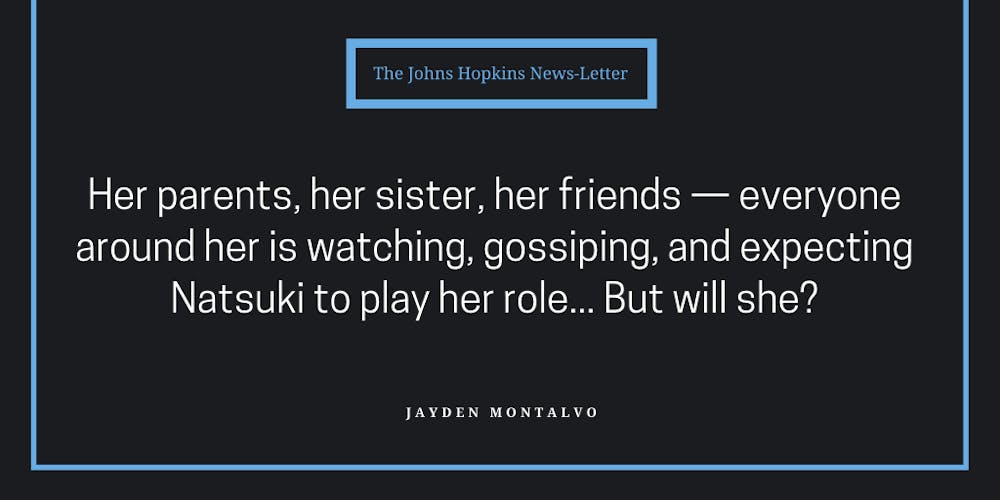The baby factory demands its revenue. Natsuki and all who are around her know this expectation. They must produce a baby at all costs because society must be prolonged, and the cycle must continue.
This is the protocol of the 2018 novel Earthlings by Sayaka Murata, which was only just translated into English last month. The novel is a treatise of nonconformity for Natsuki, our protagonist.
Natsuki wants to escape, to be herself, and it’s in this protest against expectations that the Popinpobopians — a race of aliens from the planet Popinpobopia — are introduced. As a young girl, Natsuki’s hedgehog toy Piyyut speaks to her and reveals that he is a Popinphobian on a mission to stop evil and that he can only do so with her help.
Natsuki agrees to help stop the world's evil, and Piyyut bestows upon her gifts of strength, courage and other powers to deal with these problems. Often, these problems come in the form of societal expectations. She can squeeze her hands to see the universe and the world in its true guise.
However, as readers we are left to wonder if Piyyut is a temporary escape or a means to an end. We are then forced to witness a traumatic event for Natsuki, and she is left to cope with only her cousin Yuu.
Her family treats her like a dumpster for their problems. Natsuki’s sister is jealous of her and overly sensitive because she is bullied by her classmates, so their mother gives all of her time to taking care of the sister and none to Natsuki. Her father has no care in the world. Her classmates think nothing of her. Her teacher Mr. Igasaki is being controlled by an ancient evil of the world known as the “evil witch” which Natsuki must put a stop to. Surrounded by this at such a young age, it’s difficult to see Natsuki experience a life so tormenting and surreal.
But there are not exclusively sad notes in this story. We come across scenes of happiness, such as the bonds she shares with her cousin and grandparents and what can only be described as funny forms of liberation because Natsuki must do whatever it takes to maintain and cleanse herself. In this fight for freedom, the author gives us a radically joyful thesis that leaves us wanting to cheer for our protagonist's success.
Events take a quick turn, though, as Natsuki begins to spread her message to her cousin Yuu. She finds in her adult years that there are many people who feel as she does, bound-and-gagged by the factory. No one except for her and Yuu knows of Popinpobopia, so she spreads her message to those who are closest to her, all while under the eyes of society. Some people believe she is simply childish, and the only one who she can trust is her “husband,” who is not actually her spouse because, like her, he is protesting against society.
Her parents, her sister, her friends — everyone around her is watching, gossiping and expecting Natsuki to play her role as a child bearer... But will she? Is this the path she must take, the ultimate sacrifice? She cannot bear it because this is not what she wants, and she must refuse to engage. Society will eventually catch up to her and Popinpobopia, so she has to escape. In this chase we will find a dark and tragic comedy, as the process to truly becoming a Popinpobopian is life-taking.
One aspect that is very important to understand for readers is the context in which the story is set. In Japan, the setting of this story, there is a largely homogeneous culture which is in stark contrast to the heterogeneous society of America. What this means for Natsuki is that to be a Popinphobian is to be a heretic of society. What this means for Murata is that her novel is a call not only for change but a literary plea for reform that can benefit the discourse of society for individual liberation.
In Japan as of now there are many people who refuse to even take a step out of households and affiliate with any part of society. This phenomenon known as the hikikomori shut-ins existed prior to COVID-19 and was a result of heavy expectations such as overtime workweeks, perfect school attendance, stressful grade requirements and formal manners of presentation.
These people who refuse to engage are very much reflective of Natsuki, and for those who wonder how this nonconformity develops or want to better understand how to fix these complex issues within society, I encourage you to read this novel and engage with Natsuki.
Look through her eyes and experience the pain she must bear. Fight with her through this struggle and become the heretic, not just so that you can see what this utopian society is but to understand how much better society can be.





